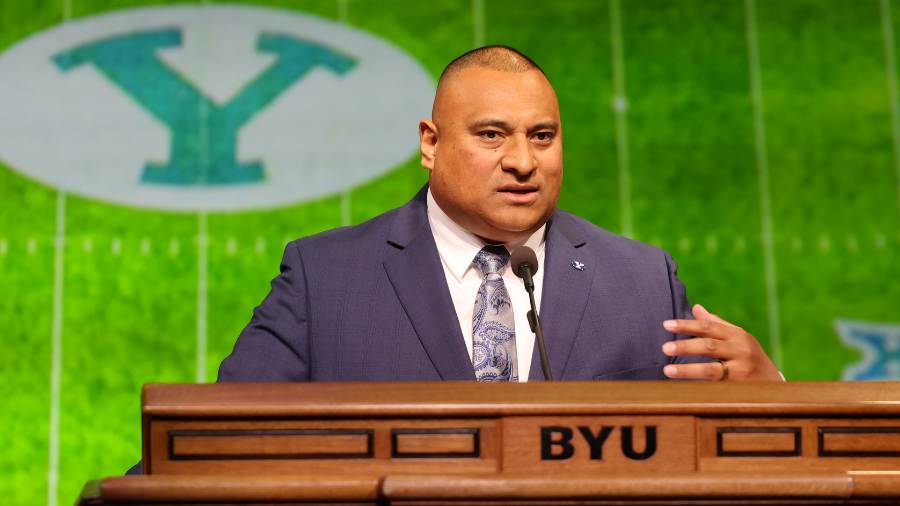IT IS OVER: BYU Football Current Head Coach Kalani Sitake had Submitted Resignation letter to….see more

 In an unexpected and shocking turn of events that has sent ripples throughout the college football world, rumors have emerged that Kalani Sitake, the current head coach of the BYU Cougars football program, has submitted his resignation letter. Although official confirmation remains elusive and no credible source has verified this claim, the implications of such a move would be monumental for BYU football.
In an unexpected and shocking turn of events that has sent ripples throughout the college football world, rumors have emerged that Kalani Sitake, the current head coach of the BYU Cougars football program, has submitted his resignation letter. Although official confirmation remains elusive and no credible source has verified this claim, the implications of such a move would be monumental for BYU football.
Kalani Sitake has been synonymous with BYU football for nearly a decade. His tenure has been marked by steady progress, passionate leadership, and an unwavering commitment to the program. The idea that Sitake might step down opens a floodgate of questions: Why now? What led to this decision? And, most importantly, what lies ahead for the Cougars?
In this article, we dive deep into the potential reasons behind such a dramatic decision, explore the impact on the team, the university, and fans, and speculate on what the future may hold for BYU football.
Chapter 1: The Rise of Kalani Sitake – From Player to Coach
Before discussing the alleged resignation, it’s essential to appreciate the man who has led BYU football with determination and pride. Kalani Sitake’s journey is a story of perseverance, leadership, and connection to the community.
Early Life and Playing Career
Born in American Samoa, Sitake played college football at BYU as a defensive back from 1998 to 2001. His playing career was characterized by a relentless work ethic and deep knowledge of the game, laying the foundation for his future coaching career.
Coaching Beginnings
After his playing days, Sitake transitioned into coaching, starting as a graduate assistant before eventually returning to BYU as an assistant coach. His dedication and football acumen caught the eye of many, and by 2016, he was appointed as the head coach — the first Polynesian head coach in the NCAA Division I Football Bowl Subdivision.
The Tenure So Far
Over nearly a decade at BYU, Sitake transformed the Cougars, guiding them through conference transitions, recruiting battles, and high-profile games. His leadership has been praised for emphasizing both athletic excellence and character development.
Chapter 2: The Alleged Resignation – What We Know So Far
While no official statement has been released from BYU Athletics or Sitake himself, the rumors of his resignation letter have ignited conversations. Here’s what’s circulating:
-
Speculation Origin: Unverified reports on social media and lesser-known sports websites allege that Sitake submitted his resignation to the BYU Athletic Director.
-
Timing: The rumors have surfaced shortly after BYU’s entrance into the Big 12 Conference, a move that represents a significant step up in competition and visibility.
-
Lack of Confirmation: Major sports outlets such as ESPN, CBS Sports, and the Associated Press have not reported on the resignation, and BYU’s official channels remain silent.
Given these facts, it’s crucial to approach the news cautiously, yet the speculation opens a window to explore possible motivations.
Chapter 3: Possible Reasons Behind the Resignation
If Sitake has indeed submitted his resignation, several factors might have influenced this decision.
1. Pressure of Big 12 Transition
BYU’s move into the Big 12 Conference brought heightened expectations. Facing stronger competition and increased scrutiny, the pressure to perform could weigh heavily on any coach. Sitake might feel that the program needs fresh leadership to navigate this new era.
2. Personal or Family Reasons
Coaching is a demanding profession that often requires sacrifices in personal life. Sitake may be stepping down for family health reasons, personal well-being, or to pursue other interests.
3. Professional Ambitions or Opportunities Elsewhere
Coaches sometimes resign to pursue opportunities in the NFL, other collegiate programs, or even outside of football. Sitake’s proven track record could attract offers that align better with his goals.
4. Differences with University Administration
Occasionally, coaches step down due to disagreements with university leadership over budget, recruiting policies, or program direction. Though no such conflict has been reported publicly, it remains a possibility.
Chapter 4: The Impact on BYU Football
The resignation of a head coach—especially one as established as Sitake—would have significant consequences for the program.
Recruiting and Player Morale
Players commit to programs based on relationships with coaches. Sitake’s departure could lead to uncertainty among recruits and current players, potentially causing transfers or decommitments.
Staff Turnover
Assistant coaches and support staff may also reconsider their positions, leading to a ripple effect impacting team cohesion.
Fan Base and Alumni Reactions
The BYU community is deeply passionate. A resignation could divide opinions, with some fans mourning Sitake’s departure and others hoping for change.
Program Stability and Future Success
Transition periods can be challenging, but they also offer opportunities for renewal. The next head coach will need to stabilize the program and build on Sitake’s foundation.
Chapter 5: Who Could Be the Next Head Coach?
Speculation around Sitake’s successor will intensify. Potential candidates might include:
-
Internal Promotions: Elevating current coordinators or assistant coaches who understand BYU’s culture.
-
High-Profile External Candidates: Coaches with a history of success in the Big 12 or similar conferences.
-
Former BYU Players or Alumni: Individuals with strong ties to the program and community.
The university’s hiring decision will be critical to maintaining or rebuilding the team’s competitive edge.
Chapter 6: Lessons from Other Coaching Resignations
Historically, high-profile coaching resignations have had varied outcomes.
-
Some programs struggled initially but rebounded under new leadership.
-
Others experienced prolonged rebuilding phases.
-
Coaches who resigned often moved on to successful careers elsewhere or returned in different roles.
Examining these patterns provides context for what BYU might expect moving forward.
Chapter 7: The Fan Perspective – Voices from the Cougar Nation
BYU fans are passionate and vocal. Social media reactions could range from shock and sadness to optimism for the future.
The fanbase’s role in supporting the team during transitions cannot be overstated. Unified support can ease the program’s adjustment and fuel success.
Chapter 8: Final Thoughts – The Future of BYU Football
Regardless of the truth behind the resignation rumors, BYU football stands at a crossroads. Whether Kalani Sitake remains or a new coach steps in, the program faces:
-
New challenges in the Big 12 Conference.
-
Opportunities to elevate its national profile.
-
The need to foster strong recruitment and player development.
The coming weeks will be critical. Official statements, staff meetings, and recruiting outcomes will reveal more.
Conclusion
The headline “IT IS OVER: BYU Football Current Head Coach Kalani Sitake Had Submitted Resignation Letter…” has stirred a whirlwind of speculation and emotion. While no official confirmation exists, the prospect of a coaching change at BYU demands attention and careful consideration.
Kalani Sitake’s impact on BYU football has been profound, and his leadership has helped build a competitive, respected program. If he truly steps away, it will mark the end of an era and the beginning of a new chapter for the Cougars.







Post Comment